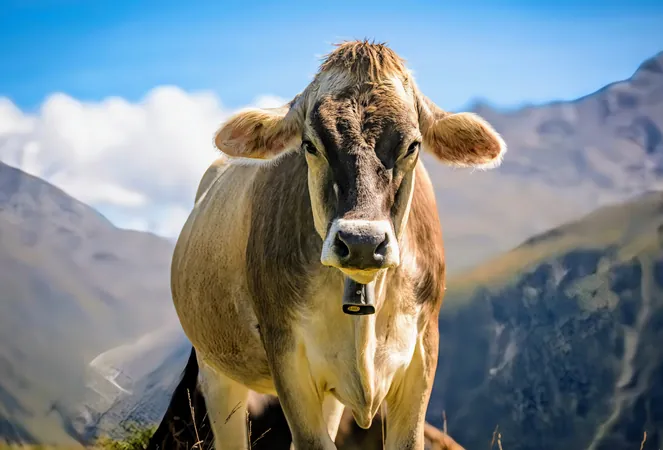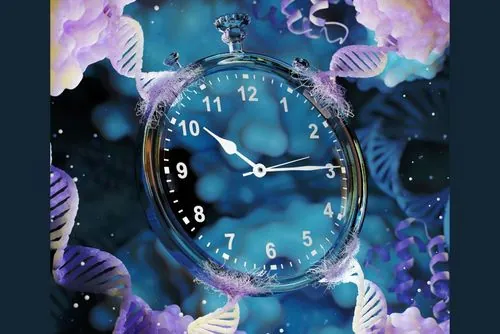
Revolutionary Pill Could Transform Cows Into Climate Heroes!
2024-12-01
Author: Noah
In an era where climate crisis looms large, scientists are turning to an unexpected ally: cows.
These gentle herbivores, known for their milk and beef contributions, might soon play a pivotal role in mitigating greenhouse gas emissions, thanks to an innovative research project gearing up at the University of California, Davis.
The Hidden Culprit: Methane Emissions from Cows
Cows are major culprits in the release of methane, a potent greenhouse gas that poses a serious threat to our planet. While methane emissions originate from various sources, the agricultural sector—especially cattle farming—accounts for a staggering amount. Postdoctoral researcher Paulo de Meo Filho leads this transformative study, embarking on an ambitious project to develop a special pill that aims to alter the gut bacteria of cows to significantly reduce, or potentially eliminate, methane emissions from their burps.
Why Methane is a Bigger Threat Than You Think
Although many believe that carbon dioxide is the main perpetrator of climate change, experts emphasize the significant impact of methane. According to Ermias Kebreab, an animal science professor at UC Davis, nearly half of the global temperature increase experienced thus far can be attributed to methane emissions. Remarkably, while methane breaks down faster than CO2, its warming potential is far more potent over a shorter duration, remaining in the atmosphere for about 12 years—as opposed to the centuries that carbon dioxide lingers.
Innovative Solutions Underway
To tackle this issue, researchers collected samples from cows' rumens—the first stomach compartment containing partially digested food—to analyze the microbes responsible for methane production. A single cow can burp out approximately 220 pounds of this harmful gas annually, showcasing the importance of finding solutions.
One intriguing approach being explored includes a specialized diet rich in seaweed, which has shown promise in reducing methane production. Scientists are also investigating the introduction of genetically modified microbes that can effectively consume hydrogen, thus starving off the methane-producing bacteria. However, caution is critical; simply eliminating these bacteria can create an imbalance in the gut, harming the cows.
The Social Life of Microbes
Microbes are not only crucial to this process but also exhibit intriguing social behaviors. These microscopic organisms tend to thrive in communities, and their interactions can influence the functionality of the entire ecosystem within the cow's stomach. Researchers are experimenting with different microbial formulations using bioreactors designed to replicate the unique conditions of a cow's digestive system.
Collaborative Efforts for Climate Solutions
The ambitious initiative isn't solely confined to UC Davis. The Innovative Genomics Institute at UC Berkeley is also on board, collaborating to identify the ideal microbe that can be genetically modified to replace harmful methane-producing bacteria. This collaboration underscores the multi-faceted approach necessary to tackle such a pressing environmental issue.
Balancing Cattle Production and Sustainability
The ultimate goal of this groundbreaking research project extends beyond merely reducing methane emissions; the team aims to improve feed efficiency as well. Kebreab explains that both hydrogen and methane serve as energy sources. By redirecting this energy, researchers hope to contribute to increased productivity without sacrificing environmental integrity.
The plan is to develop a one-time treatment administered to calves early in life, as many cattle graze freely and are challenging to supplement daily. With $70 million allocated for this innovative project and a seven-year countdown, the stakes couldn't be higher.
Why This Matters Globally
This research is not merely a U.S. endeavor; the implications stretch far into developing nations. In countries like Indonesia, where one in five children faces stunted growth due to malnutrition, there is a pressing need for sustainable meat and dairy production. Simply encouraging a reduction in meat consumption is not a universal solution; instead, this project aims to offer a pathway to a more sustainable future for livestock farming.
As we move forward, the potential for this pill to transform cows into climate heroes could be the breakthrough the planet desperately needs. Stay tuned for updates on this evolutionary leap in environmental science!









 Brasil (PT)
Brasil (PT)
 Canada (EN)
Canada (EN)
 Chile (ES)
Chile (ES)
 España (ES)
España (ES)
 France (FR)
France (FR)
 Hong Kong (EN)
Hong Kong (EN)
 Italia (IT)
Italia (IT)
 日本 (JA)
日本 (JA)
 Magyarország (HU)
Magyarország (HU)
 Norge (NO)
Norge (NO)
 Polska (PL)
Polska (PL)
 Schweiz (DE)
Schweiz (DE)
 Singapore (EN)
Singapore (EN)
 Sverige (SV)
Sverige (SV)
 Suomi (FI)
Suomi (FI)
 Türkiye (TR)
Türkiye (TR)